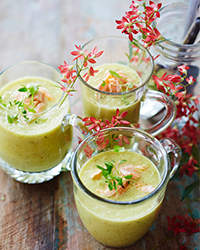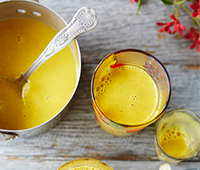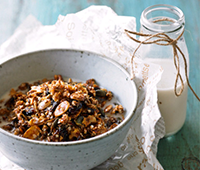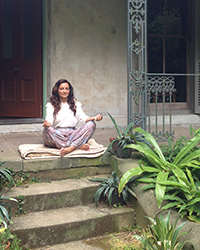
APEX Insights > Inspire > Impacts of stress on your gut health

March 2020
Impacts of stress on your gut health
When we think of stress, some of us may think of bosses putting pressure on us at work, not having enough time to do all the things we need to get done in a day and having too many commitments, such as family commitments, social events, or work commitments.
But there are other things that can negatively affect your gut health. Did you know that too much exercise, not getting enough sleep and not feeling moments of joy and pleasure in our daily life can also cause stress that affects your gut?
Stress produces too much cortisol in our bodies, which is linked to the “flight or fight” response. Cortisol activates the sympathetic nervous system. When the sympathetic nervous system is activated, the parasympathetic nervous system must be suppressed, since they cannot operate simultaneously.
Usually when we're eating, the parasympathetic nervous system is at play. This is important because for the body to best use food energy, enzymes and hormones controlling digestion and absorption must be working.
When you have a stressed out, cortisol-flooded body digestion and absorption are compromised, indigestion develops and the mucosal lining becomes irritated and inflamed. Mucosal inflammation can lead to the increased production of cortisol becoming a viscous cycle.
On the flipside, strong evidence from animal studies is showing that pathogenic bacteria and inflammation of the gut can activate the vagus nerve through an anti-inflammatory reflex that can have negative consequences for brain function, mood and anxiety levels.1
The vagus nerve is a mind–body feedback loop, where messages from the gut can travel ‘upstream’ to your brain and ‘downstream’ from your conscious mind, signalling your organs to create an inner calm so you can ‘rest and digest’ during times of safety, or to prepare your body for ‘fight or flight’ in dangerous situations.
The first step in the role of balancing gut health and stress is to be mindful of how big a role stress is playing in your life and start noticing when it affects you and what triggers it.
The next step is to look at ways of minimising the stress in your life. If you’re always stressed about being late to work, perhaps you could start getting ready a little earlier or prepare what you need the night before. It seems obvious, but these simple steps can make a very big impact in reducing our stress levels and therefore, our overall health.
When it comes to stress and nutrition, to help ease its effects on your mind and body it’s helpful to consume foods that are calming, boost the immune system, aid sleep and soothe inflammation. Eating a gut friendly diet can help to improve mood and a balanced microbiome. You’ll find lots of gut friendly recipes on my website www.superchargedfood.com
Look for in-season foods, which give your immune system a boost. As your immune system can be strained when you’re under stress, a symptom of this is frequently catching colds and infections.
Vitamin E can help strengthen the immune system2, simply by eating eight to ten almonds a day and including avocado in your diet. Avocados are really good for soothing nerves and anxiety and contain B vitamins.
Best way to start the day
Oats are a calming food which helps with serotonin - a chemical messenger believed to act as a calming mood stabiliser. Try starting the day with porridge, you can also add turmeric to it to help reduce inflammation. You might like this breakfast recipe for cranberry and walnut granola , as the omega-3s and B vitamins in walnuts can help to reduce stress.

Nutrients which alleviate stress
Magnesium is associated with stress levels and can regulate cortisol, creating feelings of wellbeing and relaxation of the muscles, this helps to calm the body down.3 Leafy greens including spinach and kale are excellent sources, the darker the better.
Omega-3 fatty acids are good for the adrenal glands which are activated by stress and they help to keep cortisol (the stress hormone) levels from spiking, they also help to lower inflammation levels4. The fatty acids also lower the level of blood fats called triglycerides. Fish especially salmon are one of the best sources of omega-3s as well as flax seed oil and chia seeds.
My salmon chowder is a wonderful dish for dinner for the whole family.
The curry powder in the chowder enhances the flavours in this dish and gives it a slight kick and earthiness. Research shows that when observing cultures where curry is a staple item, such as India, it has been noted that there are fewer instances of inflammation-based diseases and conditions5 .
Chill out by cooking with healing herbs
Basil helps to calm the nervous system down and mint is cooling and calming.
Rosemary’s good for soothing headaches, try sprinkling it onto sweet potato, or pumpkin as it combines vitamin C and anti-oxidant rich carbohydrates, which also stabilise blood sugars.
Indian spices cumin and cardamom are comforting, warming and relaxing for the body and they work well with turmeric and nutmeg.

Soothe inflammation
Turmeric helps lower inflammation, helps with stress and is good for general wellbeing6. It can be added to curries, stir fries, scrambled eggs, frittatas and rice.
Turmeric is also good with oven-roasted vegies, such as cauliflower and root vegetables, with garlic, lemon and oil which caramelises nicely. You can also mix it with sautéed greens like kale or spinach.
Make calming snacks
Easy to make snacks are sliced banana with oat milk and mint, as bananas have potassium and vitamin B-6, which are good for stress.

For an afternoon snack, you can make your own trail mix with magnesium rich nuts such as walnuts and almonds with seeds and berries. Adding dark chocolate with 85 per cent cocoa can lift your mood, however just a small amount is best as too much can make you anxious.
Any easy and tasty recipe for baked trail mix is here.
Eat your smallest meal at night
As prescribed by Ayurvedic, Indian traditional medicine, I suggest eating your smallest meal at night and the biggest at lunchtime. If you’re overeating ask yourself: ‘Am I really hungry or is it a stress craving?’

Need help to sleep?
Herbal teas including chamomile and lemon myrtle leaf aid sleep. You can make your own soothing tea mixes, such as with chamomile and lavender. Adding nutmeg to a warm drink can also help you sleep or try my Anti Inflammatory Toddy Tea recipe here.
To help you manage your stress, I've created a meditation audio for you. It’s a relaxation guide that will help you unwind and combat feelings of stress and anxiety.
You can find the guided meditation here, let me know what you think of it and if it has helped you.
Gut health is important for your mental health and overall wellness, it’s one of the most important components of the body. We interact with it daily and it’s something intricately connected to many aspects of our everyday life.*
OnePath Life Limited (OnePath Life) is committed to deliver market leading mental health and wellness solutions with a focus on service, customer wellness and prevention. The focus on mental health and wellness is at the core to OnePath Life’s proposition. To deliver on our commitment, we have developed a suite of tools, education pieces, and collaborated with partners to provide our customers with the support they may need to facilitate a healthy life. OnePath Life has proudly partnered with Lee Holmes to provide education and nutritional inspiration for our customers to supercharge their health.
References
* Important note
The information related to your health is not intended to be a substitute for professional medical advice, diagnosis, or treatment. Always seek the advice of your physician or other qualified health provider with any questions you may have regarding a medical condition.
This material is intended for the use of financial advisers only and is distributed by OnePath Life Limited (OnePath Life) (ABN 33 009 657 176, AFSL 238341).
The information, opinions and conclusions in articles ("information") are current as at the date articles are written as specified within but are subject to change. The articles are provided and issued by OnePath Life unless another author is specified in the article, in which case it is provided and issued by that author. The views expressed are those of the authors only and do not necessarily reflect the opinions or views of OnePath Life, its employees or directors. Whilst care has been taken in preparing this material, OnePath Life and its related entities do not warrant or represent that the information is accurate or complete. To the extent permitted by law, OnePath Life and its related entities do not accept any responsibility or liability from the use of the information.
The information is of a general nature and has been prepared without taking into account a potential or existing investor’s objectives, financial situation or needs. Investors should consider whether the information is appropriate for them having regard to their objectives, financial situation or needs. For any product referred to above, OnePath Life recommends that investors read any relevant offer document or product disclosure statement and consider if the product is appropriate to them. For products issued by OnePath Life, these documents are available at access.onepathsuperinvest.com.au.
Past performance is not indicative of future performance and any case study shown is for illustrative purposes only. Neither are a prediction of the actual outcomes which will be achieved. Where tax or technical information is included, the information is our interpretation of the law and does not represent tax advice. An investor is advised to obtain professional advice relevant to their individual circumstances.